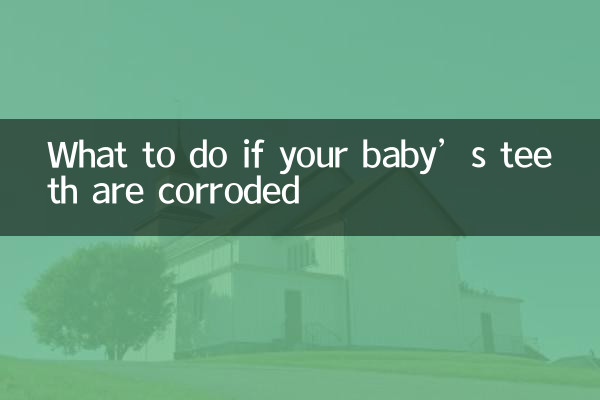What to do if your baby’s teeth are corroded: Comprehensive analysis and coping strategies
In recent years, the problem of dental caries in infants and young children has attracted increasing attention from parents. According to the hot spot data on the entire network in the past 10 days, the search volume of topics related to "baby tooth corrosion" increased by 35% month-on-month, becoming a hot discussion focus in the field of parenting. The following is a structured analysis and solution to this problem.
1. Data analysis of the current status of baby tooth erosion (last 10 days)

| Data dimensions | Statistical results |
|---|---|
| Related topic search volume | Average daily 12,800 times |
| Most frequently consulted age group | 1-3 years old (accounting for 68%) |
| Main symptoms | Yellow teeth (42%), sunken surfaces (33%), sensitivity and pain (25%) |
| Parents’ biggest concerns | Whether it affects the development of permanent teeth (55%), pain relief methods (28%), and preventive measures (17%) |
2. Three main causes of tooth erosion
1.Improper feeding habits: Frequent feeding at night (especially formula milk) can lead to "bottle caries", and nearly 73% of cases are related to this.
2.Insufficient oral hygiene: Survey shows that only 29% of parents will start brushing their baby’s teeth immediately after teething.
3.Dietary structure issues: Excessive intake of sugary foods (such as juice, cookies, etc.) will accelerate tooth demineralization.
3. Grading treatment plan
| Corrosion degree | clinical manifestations | Handling suggestions |
|---|---|---|
| Mild | Chalky color change on tooth surface | Brush your teeth with fluoride toothpaste + apply fluoride regularly |
| Moderate | Obvious cavities appear | Requires professional filling treatment + dietary adjustment |
| Severe | Pulp exposure or severe pain | Root canal treatment or extraction + space maintainer |
4. Authoritative prevention guideline (recommended by the Chinese Stomatological Association)
1.cleaning schedule: Use gauze to clean gums immediately after birth, and use a baby toothbrush after the first tooth erupts.
2.Feeding advice: After 1 year old, give up the habit of breastfeeding and drink boiled water instead of sugary drinks.
3.Regular inspection: It is recommended to have a professional oral examination every 3-6 months and complete the first fluoride application before the age of 3.
5. Correction of common misunderstandings among parents
•Misunderstanding 1: "Don't worry about broken deciduous teeth" → Fact: Severe dental caries can lead to abnormal development of permanent teeth
•Misunderstanding 2: "Don't brush your children's teeth if they resist" → Suggestion: Use fun brushing tools and establish a fixed process
•Misunderstanding 3: "Brush your teeth immediately after eating sweets" → Correct: Rinse your mouth first and then brush your teeth half an hour later
6. Emergency handling
When your baby has severe toothache:
1. Rinse your mouth with warm salt water for relief
2. Apply cold compress to the affected side of the face
3. Avoid self-medication
4. See a doctor within 24 hours
7. Nutritional supplement suggestions
| Nutrients | function | food source |
|---|---|---|
| Calcium | Strengthen tooth enamel | Cheese, yogurt, tofu |
| Vitamin D | Promote calcium absorption | Deep sea fish, egg yolk |
| Phosphorus | Repair dentin | Lean meat, nuts |
Through scientific prevention and timely treatment, most dental caries problems in infants and young children can be effectively controlled. It is recommended that parents establish a dental health file to record the results of each examination and intervention measures to lay a good foundation for their baby's oral health.

check the details

check the details